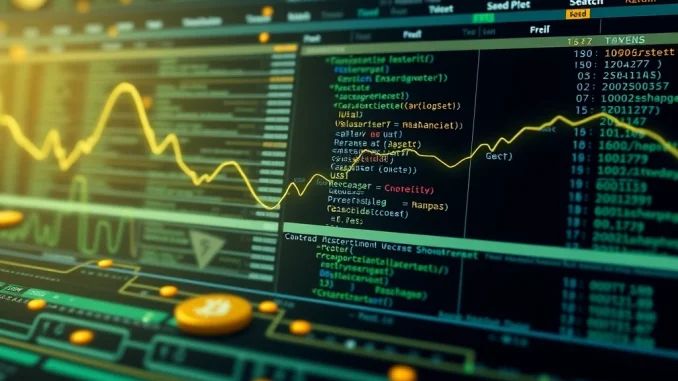
In a surprising turn of events in the fast-paced world of decentralized finance (DeFi), the exploiter behind the recent $7 million breach of perpetual decentralized exchange KiloEx (KILO) has begun to return a portion of the stolen funds. According to blockchain security firm PeckShield, approximately $1.4 million in USDT has been sent back to the platform. This partial crypto recovery offers a glimmer of hope amidst ongoing concerns about decentralized exchange security and the vulnerabilities within the burgeoning DeFi ecosystem. But what does this mean for KiloEx users and the broader crypto landscape?
The KiloEx Exploit: A Deep Dive into the $7M Breach
On April 15th, KiloEx, a decentralized exchange focused on perpetual contracts, fell victim to a sophisticated crypto exploit. This security incident resulted in a significant loss of around $7 million, sending ripples of concern through the DeFi community. The breach highlighted the ever-present risks associated with smart contracts and the potential for malicious actors to target even seemingly robust platforms. Here’s a quick breakdown of the initial KiloEx exploit:
- Date of Breach: April 15th
- Platform Affected: KiloEx (KILO) – Perpetual Decentralized Exchange
- Estimated Loss: Approximately $7 million
- Nature of Exploit: Security breach exploiting vulnerabilities in the platform’s smart contracts
- Initial Reaction: Community concern and platform investigation
The scale of the initial loss was substantial, raising questions about the platform’s security protocols and the overall resilience of decentralized exchanges to such attacks. Many in the crypto space wondered if any of the funds would ever be recovered.
A Ray of Hope: $1.4M USDT Recovery Signals a Potential Shift
In a welcome development, PeckShield, a leading blockchain security firm, announced on X (formerly Twitter) that an address identified as the KiloEx exploiter has returned roughly $1.4 million USDT to the platform. This partial USDT recovery represents about 20% of the total funds stolen and injects a degree of optimism into an otherwise concerning situation.
[img] [/img]
While the reasons behind the fund return remain unclear, it sparks several possibilities:
- Pressure from the Community and Security Firms: Increased scrutiny and public attention might have pressured the exploiter.
- Legal Implications: The potential for identification and legal repercussions could be a deterrent.
- Ethical Considerations (Unlikely but Possible): A change of heart, although less probable, cannot be entirely ruled out.
- Strategic Move: Returning a portion might be a tactic to negotiate further or reduce scrutiny while retaining a significant portion of the stolen funds.
Decentralized Exchange Security: What Can We Learn from the KiloEx Incident?
The KiloEx exploit and subsequent partial recovery underscore the critical importance of robust decentralized exchange security measures. As DeFi platforms continue to grow in popularity and manage increasingly large sums of assets, they become prime targets for malicious actors. What are the key takeaways and actionable insights for users and developers in the DeFi space?
Strengthening Smart Contract Audits
Rigorous and frequent smart contract audits are paramount. These audits should be conducted by reputable third-party security firms with expertise in blockchain vulnerabilities. Audits should not be a one-time event but an ongoing process, especially with platform upgrades and new feature deployments.
Enhanced Monitoring and Anomaly Detection
Real-time monitoring systems and anomaly detection tools are crucial for identifying and responding to suspicious activities promptly. Platforms should invest in sophisticated security infrastructure to detect and mitigate potential exploits before they escalate.
Multi-Signature Wallets and Custodial Solutions
Implementing multi-signature wallets for critical platform functions can add an extra layer of security by requiring multiple approvals for transactions. Exploring secure custodial solutions for a portion of assets can also be considered, balancing decentralization with security.
Community Vigilance and Transparency
A vigilant and informed community plays a vital role in identifying potential vulnerabilities and holding platforms accountable for security practices. Transparency from platforms regarding security measures and incident responses is essential for building trust and fostering a secure DeFi ecosystem.
The USDT Recovery Process: How Did KiloEx Get Some Funds Back?
While details of the exact USDT recovery process remain somewhat opaque, the fact that funds were returned is a positive signal. Generally, when funds are returned in such situations, it involves the exploiter transferring the assets back to a designated address controlled by the affected platform. In this case, the exploiter address, as identified by blockchain analysis, initiated the transfer of USDT back to KiloEx.
The specifics could involve:
- Direct Transfer: The exploiter directly sent the USDT tokens back to a KiloEx-controlled wallet address.
- Negotiated Return (Less Likely in Public Exploits): In some cases, there might be behind-the-scenes negotiations, although less common in high-profile exploits like this.
- On-Chain Tracking and Pressure: The public nature of blockchain transactions allows for on-chain tracking, potentially increasing pressure on the exploiter to return funds, even partially.
PeckShield’s Role in Uncovering Blockchain Security Breaches
Blockchain security firms like PeckShield play a pivotal role in identifying, analyzing, and reporting on security breaches within the crypto space. Their expertise in on-chain analysis, smart contract auditing, and threat intelligence is invaluable in:
- Identifying Exploits: Proactively monitoring blockchain networks to detect suspicious transactions and potential exploits.
- Analyzing Breaches: Investigating the technical details of exploits to understand vulnerabilities and attack vectors.
- Tracking Funds: Tracing the movement of stolen funds on the blockchain to aid in potential recovery efforts.
- Providing Security Intelligence: Sharing insights and best practices with the crypto community to enhance overall security.
PeckShield’s announcement regarding the USDT recovery in the KiloEx case highlights the importance of their work in maintaining transparency and accountability within the often opaque world of cryptocurrency.
Conclusion: A Partial Victory, But Vigilance Remains Key
The partial crypto recovery of $1.4 million USDT by KiloEx is undoubtedly a positive development after the devastating $7 million KiloEx exploit. It serves as a reminder that even in the face of significant security breaches, there can be unexpected turns and partial victories. However, it’s crucial to recognize that the majority of the stolen funds remain unrecovered, and the incident underscores the ongoing challenges in decentralized exchange security.
The DeFi community must continue to prioritize security, invest in robust infrastructure, and foster a culture of vigilance. While the return of funds offers a glimmer of hope, it also serves as a stark warning: the fight against crypto exploits is far from over, and continuous efforts are needed to secure the future of decentralized finance.



